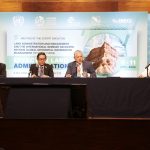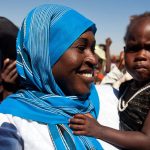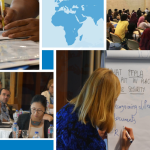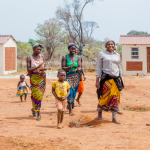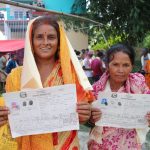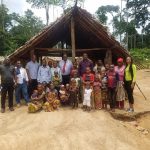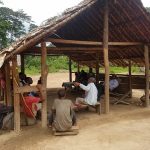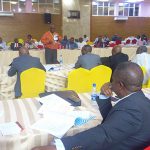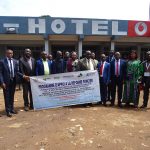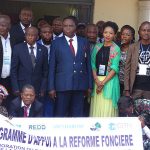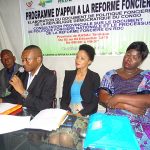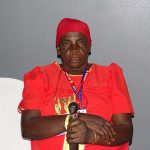Country Information
With a surface area of 2 345 410 square kilometers and a population of approximately 89 million (of which nearly 70% live in rural areas), the Democratic Republic of the Congo (DRC) is endowed with about 135 million hectares of agricultural land, that is neither forest nor montane land, and which represent about 34% of the national territory. Of this, only 10% is developed. Despite the fact that the law vests the management of land in the state (the government), both urban and rural land, a large portion of these lands continue to be governed by customary law and practices through which traditional chiefs claim a historical and social right to management.
The absence of an adapted land policy adapted to the new strategic directions of sustainable development (Millennium Development Goals) and to the developments recorded by the country on the political, economic, social, cultural and environmental level is pointed out as one of the major causes deficits that we deplore today. It has resulted in the emergence of a system and practices that do not promote land productivity. In this context, rather than being an instrument of social pacification and one of the supports of economic development, this system polluted by corruption and the ineffectiveness of the Land Administration has led to mixed results, which have been reflected in particular by the insecurity of land tenure in rural and peri-urban areas, the predominance of practices on the fringes of the law in urban areas, the proliferation of land disputes, land speculation, insufficient valuation of land resources and of their products, etc.
These practices bring out the weak capacity of land departments of the government including:
- Weak management of the sector.
- Lack of an adequate system of land information management and maintenance of records.
- Lack of transparency in land transactions.
- Conflicts between the land administration departments and traditional authorities.
- Lack of a harmonization/cooperation of the institutional framework.
Taking into account the socio-economic developments in the country and new directions suggested by the modernizing vision of the Congolese government, several factors justify the launching of a debate around land governance in DR Congo: legal, political, economic, and socio-cultural.
UN-Habitat with the technical support of GLTN has been operating in the DRC since 1998. During this period, a wide range of projects and programs with real impact on the lives of the populations have been developed:
- The National Survey on Housing and Socio-economic Profile of households in urban areas/ RDC 1999 survey, with funding from the UNDP;
- The study of the National Action Plan for Housing along with a priority investment program, approved by the Government of the DRC in 2002, with funding from the UNDP;
- The Urban Plan of the Lac Vert / Mugunga site, east of the city of Goma in 2002-2003 after the Nyiragongo volcanic eruption, with funding from the UNDP;
- The Community Participatory Program in 2006-2007 in the municipalities of Ndjili and Masina in Kinshasa with funding from the Spanish cooperation.
- The Urban Development Plan of the City of Kisangani, in 2009 – 2010 with funding from the UNDP;
- The Participatory Slum Improvement Program, first and second phases in Bunia, Kisangani, Lubumbashi and Kinshasa, since 2004 with funding from the European Union.
Later on, UN-Habitat implemented the following projects and programs:
- Community Participatory Land Planning
- Project “Amani ni njia ya Maendeleo”: “Peace is the way of Development” (IRF Mambasa) – Phase 2
- Integrated North Kalehe stabilization project in South Kivu. Phase 2
- PAMOJA KWA AMANI
- Land governance, social cohesion, socio-economic reintegration and prevention of Gender-based Violence in Kitshanga.
- Support to DRC land reform program: Elaboration of the land policy document in the DRC
These programmes have finished except the Support to DRC Land Reform Programme which is still under implementation. Resource mobilization for new interventions is done at local, national and international levels to ensure the continuity of UN-HABITAT/GLTN programs in the country.
Land Reform Programme
Implemented with the support of UN-Habitat / GLTN, in collaboration with the National Ministry of Land Affairs through the National Commission of Land Reform ‘CONAREF: Commission Nationale de la Reforme Foncière’, the land reform Support Program is registered in the National REDD + Strategy and its Investment Plan. This Program, as approved, aims to improve the land management to avoid conflicts, contribute to the permanence of realized emissions reductions and improve the attractiveness of REDD +investments, for effective and efficient implementation of REDD + in the DRC.
The Land Reform Support Program comprises three main work axes, reflecting its specific objectives, namely:
- the strengthening of the National Land Reform Commission or ‘Commission Nationale de Reforme Foncière’ (CONAREF) so that it can be able to take over and implement the land reform,
- participatory formulation of a national land policy document and legal texts and related regulatory requirements
- the development of methodological guides for strengthening the ‘Cadastres’ and capitalize lessons learnt from pilot experiences (December 2018).
Current status of the programme as for January 2020:
- CONAREF is functional and conducting its statutory meetings at a regular basis. The Administration and Finance manual of procedures has been validated and is in use. Capacity building for staffs has been launched.
- The first draft of the Land Policy document is available and undergoing provincial consultations in order to make the land reform a participative process and collect land stakeholders’ inputs on the draft Land policy document.
- The land information system (LIS) is under experimentation through Community Land Register as part of LIS at community level. The methodological guides as tool for support to communities have been drafted.
Key documents
- Country Brief
- GLTN – DRC Plan of Action
- Improving women’s access to land in Eastern DRC: Challenges and emerging opportunities
- Guide to Land Mediation
- Guide de mediation fonciere: Base sur l’Experience de l’Est de la Republique Democratique du Congo
- Atelier de Consultation des Partenaires sur le Developpement du Plan D’amenagement Foncier Participatif (PAFP)
Key events
- Country Brief
- GLTN – DRC Plan of Action
- Improving women’s access to land in Eastern DRC: Challenges and emerging opportunities
- Guide to Land Mediation
- Guide de mediation fonciere: Base sur l’Experience de l’Est de la Republique Democratique du Congo
- Atelier de Consultation des Partenaires sur le Developpement du Plan D’amenagement Foncier Participatif (PAFP)

